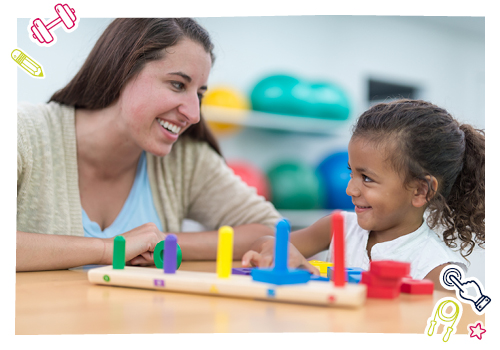NDIS Occupational Therapy – Help With Development
We consider the unique needs of your child and your family to get the most out of developmental occupational therapy
Our Occupational Therapists work with children and adolescents with disability, including those with physical, psychological or emotional challenges. We help kids with developmental delay, or conditions such as autism spectrum disorder, cerebral palsy, and intellectual disability.
We want to help your child develop and get more out of life today. We do this by working in partnership with you, and other important people in your child’s life, such as teachers, and other health professionals.
We believe that communication is at the foundation of successful relationships, so our focus is on listening, assessing and developing a plan that focuses on your child’s strengths and needs. Most importantly, we strive for respect and care in all that we do, and with inclusion as the primary goal of our involvement in your child’s development.
Ready to get started?

We can help you or your child in the following ways:
- Develop fine motor skills so they can grasp and release toys and develop good handwriting or computer skills
- Improve hand-eye coordination so they can play and carry out school skills such as hit a ball and copy from a whiteboard.
- Mastering daily living skills such as bathing, getting dressed, brushing teeth, and self-feeding
- Manage frustration and anger with positive behaviour support and social skills
- Get special occupational therapy equipment to help them build independence. Examples include wheelchairs, bathing equipment, and dressing devices
Play and learning
Young people spend their time playing, learning and in self-care, so an occupational therapist is interested in helping children with disability to engage more easily in these everyday occupations. From dressing and eating to attending school and socialising with friends, developmental occupational therapy interventions can make a significant difference in a child’s ability to participate in daily life activities and thrive in their community.
Our Occupational Therapists work with children with disability in therapy sessions in their home, at their school or kindergarten, or in one of our clinics. Ability Action Australia’s approach is to help you overcome barriers by engaging you in everyday activities, exercises and other therapies.
The goal of our Occupational Therapists is to help children succeed. We want to enhance a child’s development, minimise the potential for developmental delay, and assist families to meet the needs of their child.
Quote from an Ability Action Australia Occupational Therapist: “An example of how an occupational therapist might help increase a child’s ability to participate in their learning environment might be that the child is having difficulty at kindergarten during mat time, or the group time on the mat. And so the occupational therapist might go in and observe the child during that time, and find the reasons why that child’s having difficulties in that activity.”
We can help you or your child in the following ways:
- Develop fine motor skills so you can grasp and release toys and develop good handwriting or computer skills
- Improve hand-eye coordination so you can play and do needed school skills such as hit a ball and copy from a whiteboard.
- Master basic life skills such as bathing, getting dressed, brushing teeth, and self-feeding
- Learn positive behaviours and social skills by practising how you manage frustration and anger
- Get special equipment to help build you independence. Examples include wheelchairs, bathing equipment, and dressing devices
The goal of our occupational therapists is to help children succeed. We want to enhance a child’s development, minimise the potential for developmental delay, and assist families to meet the needs of their child.
Quote from an Ability Action Australia Occupational Therapist: “An example of how an occupational therapist might help increase a child’s ability to participate in their learning environment might be that the child is having difficulty at kinder during mat time, or the group time on the mat. And so the occupational therapist might go in and observe the child during that time, and find the reasons why that child’s having difficulties in that activity.”
Are you ready to get started? It’s easy!
Why choose us?

Achieve your goals

Local allied health professionals

Multidisciplinary Care
Multidisciplinary care is when a team of health professionals with different skills collaborate to support as many of your needs as possible. Our multidisciplinary team can support you reach your goals!
What People Say About Us
Developmental Therapy Frequently Asked Questions
Developmental therapy is a type of therapy that focuses on helping individuals who have developmental delays or disabilities to improve their physical, cognitive, emotional, and social development. It is typically used to assist children who have difficulties meeting age-appropriate developmental milestones, such as learning to walk, talk, or interact with others.
The goal of developmental therapy is to help children reach their full potential and improve their overall quality of life. To achieve this goal, developmental therapists and NDIS key workers will typically work alongside the child’s family and caregivers to help them create a supportive environment that promotes healthy development. They may also provide direct interventions to address specific developmental challenges.
There are numerous techniques used in developmental therapy for children, and the exact approach will depend on the individual child’s needs. Some common techniques that are used include:
- Play therapy: An important part of our early childhood approach, this type of therapy uses play to promote a child’s emotional, social and cognitive therapy.
- Physical therapy: This involves working on physical skills, such as balance and coordination. Physical therapy may include exercises, stretches and other activities that help to improve strength and flexibility.
- Occupational therapy: Child development services for occupational therapy focus on helping the child develop specific skills that are needed for daily living and working. An occupational therapist may incorporate activities that improve fine motor skills or self-care skills.
- Speech therapy: This involves working on language and communication skills, including vocabulary, articulation and comprehension.
- Behavioural therapy: This type of therapy centres on teaching new skills and reinforcing positive behaviour.
It’s important to note that all children develop at their own pace, and some may experience temporary delays in certain areas. However, there are certain signs that may indicate that a child is experiencing developmental delay. This includes:
- Not reaching developmental milestones at the expected age (e.g., not crawling by 9 months, not walking by 18 months).
- Difficulty with self-care tasks, such as dressing, using utensils or brushing teeth.
- Lack of interest in playing with others or difficulty making friends.
- Difficulty following instructions or understanding spoken language.
- Delayed or impaired speech or language skills.
- Unusual or repetitive behaviours.
- Difficulty with transitions or changes in routines.
Ready to get started with developmental therapy services and support for your loved one? Scroll down to make a referral, give us a call, or send us an email to learn more about how Ability Action Australia can help.

NDIS Occupational Therapy
The National Disability Insurance Scheme (NDIS) is a way of supporting people with permanent and significant disability. The NDIS is designed to give individuals greater choice and control over when, where and how their funded supports are provided. The specific support and funding available is based on each individual’s specific needs. You can find out more about what therapeutic supports are funded by referring to the NDIS website.
Ability Action Australia has the capability to provide Occupational Therapy Australia wide.




